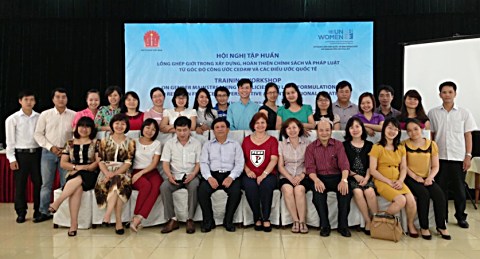Equipping Viet Nam’s law makers with skills to realize non-discrimination of women in laws
Date:
Author(s): Thao Hoang
Viet Nam - Yen Tran, 38, and her fellow law-makers are having a hard time understanding how to take gender differences into consideration when drafting or revising laws. UN Women and the Ministry of Justice (MOJ), as part of a three-year cooperation project finishing in 2015, are helping professionals like Yen learn how to overcome these challenges and prevent laws inadvertently discriminating against women.

Law makers in Viet Nam learnt about key principles of CEDAW and their relevance to gender responsive law-making. Photo credit: Viet Nam’s Ministry of Justice
“Gender mainstreaming in [the] formulation of laws is mandatory in Viet Nam. However, we [law-makers] face difficulties identifying how polices and laws we propose may impact differently on women and men as well as make sure they equally benefit from laws,” said Yen, a MOJ legal officer.
Viet Nam has made tremendous strides in developing its legal system since committing to becoming a rule-of-law State in 1991 and adopting a judicial reform policy in 2005. These reforms, along with the passage of the 2006 Law on Gender Equality, firmly illustrate the Government’s commitment to building a just and democratic legal system which addresses the needs of all Vietnamese citizens and ensure women’s and human rights.
However, women in Viet Nam still encounter difficulties in everyday life and within the legal system.
“Women and men have physical differences, but also different social roles and expectations that prevent women from enjoying the full benefits of Viet Nam’s rapid socio-economic development. Therefore, policies and laws should be formulated to address women’s historical disadvantages and unmet needs as well as provide equal opportunities to ensure substantive gender equality,” said Petra Smutny, a Court of Appeals Judge from Vienna who led a training workshop on gender mainstreaming in formulation and revision of laws, organized in May by UN Women and the Committee for the Advancement of Women in Justice Sector (CFAWJS).
During the training in Hai Phong, supported by the Austrian Embassy, Yen and 46 policy and law-makers learnt about key principles of the Convention on the Elimination of All Forms of Discrimination against Women (CEDAW) and their relevance to gender responsive law-making. Participants also discussed gender gaps in Vietnamese and international laws and shared practical experiences of reviewing and amending laws to better protect women’s rights.
The training workshop was very helpful for my daily work. It has become my conditioned response to think about gender, CEDAW and other human rights conventions when reviewing legislative papers,” Yen said.
It is particularly important right now because Viet Nam is going through amendments to the Marriage and Family Law, Civil Status Law, Civil Code, Penal Code and Penal Procedural Code, to bring them in line with the newly revised Constitution,” Yen said in a separate interview one month later.
The training workshop “Gender mainstreaming in formulation and revision of laws”, also supported by Department of Foreign Affairs, Trade and Development Canada, is part of an ongoing UN Women effort with partners to mainstream gender in laws. In the future, UN Women and CFAWJS will conduct similar trainings and workshops on CEDAW and women’s human rights as part of the cooperation framework.